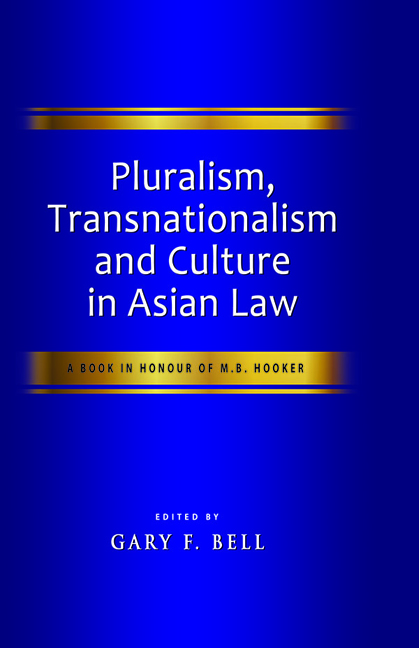Book contents
- Frontmatter
- Dedication
- Contents
- Preface
- Acknowledgements
- About the Contributors
- Chapter 1 M.B. Hooker and Southeast Asian Law: Path-breaking Passions
- Chapter 2 Asian Thought and Legal Diversity
- Chapter 3 Comparative Law, Anti-Essentialism and Intersectionality: Reflections from Southeast Asia in Search of an Elusive Balance
- Chapter 4 Legal Pluralism and Legal Anthropology: Experiences from Indonesia
- Chapter 5 Mapping the Relationship of Competing Legal Traditions in the Era of Transnationalism in Indonesia
- Chapter 6 Indonesia's Weak State Courts and Weak Law Fare Poorly in a Pluralist Commercial World
- Chapter 7 When Laws Are Not Enough: Ethics, Aesthetics, and Intra-Religious Pluralism in Contemporary Indonesia
- Chapter 8 Legal Pluralism and the Constitutional Position of East Malaysia's Indigenous Peoples: The View from the Longhouse
- Chapter 9 Sharia, State and Legal Pluralism in Indonesia: How Law Can You Go?
- Chapter 10 Negotiating Legal Pluralism in Court: Fatwa and the Crime of Blasphemy in Indonesia
- Chapter 11 Islamic Law in Israel: A Case Study in Legal Pluralism
- Chapter 12 The Road to Democracy Goes Through Religious Pluralism: The Indonesian Case and Thoughts on Post-Mubarak Egypt
Chapter 2 - Asian Thought and Legal Diversity
Published online by Cambridge University Press: 12 January 2018
- Frontmatter
- Dedication
- Contents
- Preface
- Acknowledgements
- About the Contributors
- Chapter 1 M.B. Hooker and Southeast Asian Law: Path-breaking Passions
- Chapter 2 Asian Thought and Legal Diversity
- Chapter 3 Comparative Law, Anti-Essentialism and Intersectionality: Reflections from Southeast Asia in Search of an Elusive Balance
- Chapter 4 Legal Pluralism and Legal Anthropology: Experiences from Indonesia
- Chapter 5 Mapping the Relationship of Competing Legal Traditions in the Era of Transnationalism in Indonesia
- Chapter 6 Indonesia's Weak State Courts and Weak Law Fare Poorly in a Pluralist Commercial World
- Chapter 7 When Laws Are Not Enough: Ethics, Aesthetics, and Intra-Religious Pluralism in Contemporary Indonesia
- Chapter 8 Legal Pluralism and the Constitutional Position of East Malaysia's Indigenous Peoples: The View from the Longhouse
- Chapter 9 Sharia, State and Legal Pluralism in Indonesia: How Law Can You Go?
- Chapter 10 Negotiating Legal Pluralism in Court: Fatwa and the Crime of Blasphemy in Indonesia
- Chapter 11 Islamic Law in Israel: A Case Study in Legal Pluralism
- Chapter 12 The Road to Democracy Goes Through Religious Pluralism: The Indonesian Case and Thoughts on Post-Mubarak Egypt
Summary
We owe much of our knowledge of legal diversity in Asia to the work of Barry Hooker, who appears early on to have appreciated its intrinsic interest and potentially global significance. His work in the field is, as the French say, incontournable; a nice combination of the unavoidable, the controlling and the greatly respected. These lines are offered in such a spirit of respect, but rather than attempting to emulate the master in richness of exposition, they take refuge in a larger and more abstract perspective, in attempting to situate Asian legal diversity in some broad currents of Asian thought, contrasted in some measure with the European thought which has contributed so greatly to contemporary concepts of states and state law in the world.
Classical European Forms of Logic
States and the law of states have developed in all cases as the result of the particular circumstances of each state, but there are common forms of thought which underlie, in some measure, all states. The most remarkable of these has been the dichotomy, first announced (apparently) by Plato and adopted in a massive manner subsequently by Western thinkers, legal and otherwise. Plato argued that in order to begin to understand the world, one should first divide it conceptually into two. He wrote that “it's not at all difficult to separate into two all of those things that come into being”, and that we should “divide all cases of knowledge in this way”. This initial diaeresis or divisio, moreover, should be followed by others, each yielding more detailed forms of taxonomic division until a point was reached which satisfied the intellectual and practical needs of those effecting the divisions or separations. Platonists today are not thick on the ground, but this simple and crude idea has been the most wildly successful of his proposals, over millennia. In civilian teaching it has been the foundation of the idea of a summa divisio, such as that between public and private law, or patrimonial and non-patrimonial rights, or contractual and extra-contractual liability.
- Type
- Chapter
- Information
- Pluralism, Transnationalism and Culture in Asian LawA Book in Honour of M.B. Hooker, pp. 31 - 51Publisher: ISEAS–Yusof Ishak InstitutePrint publication year: 2017

